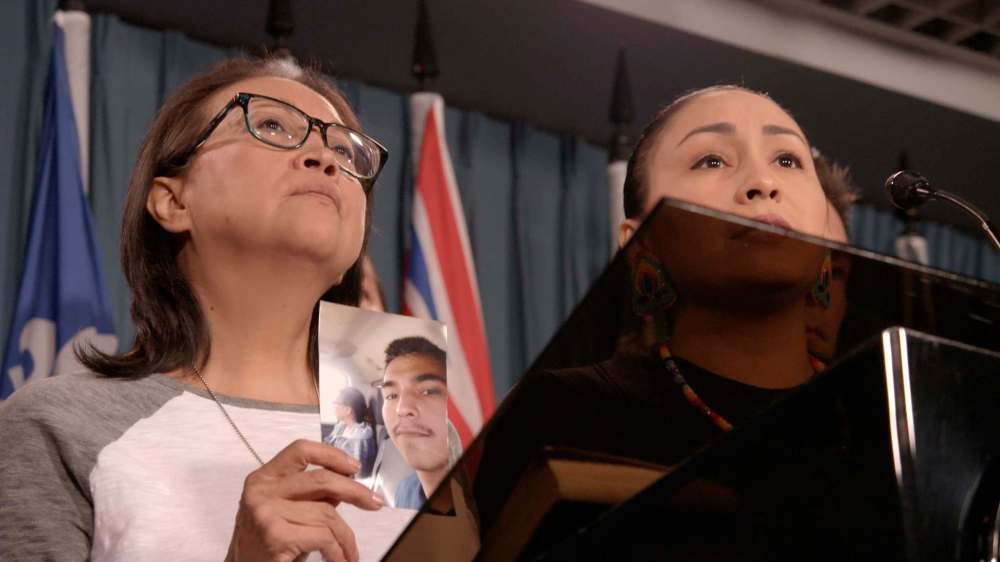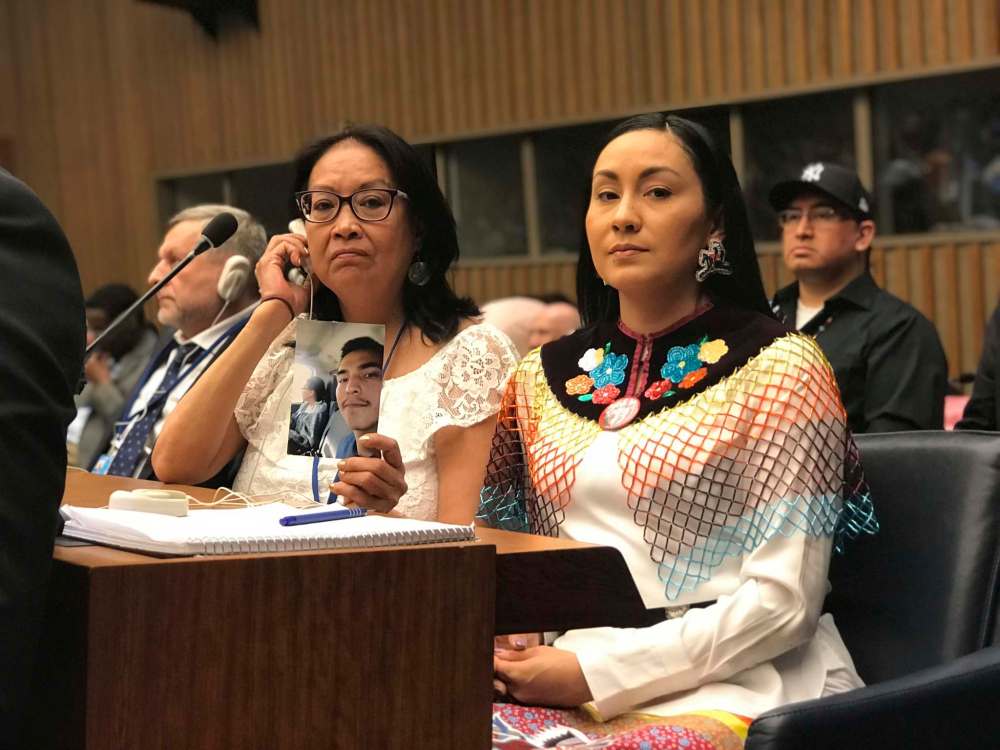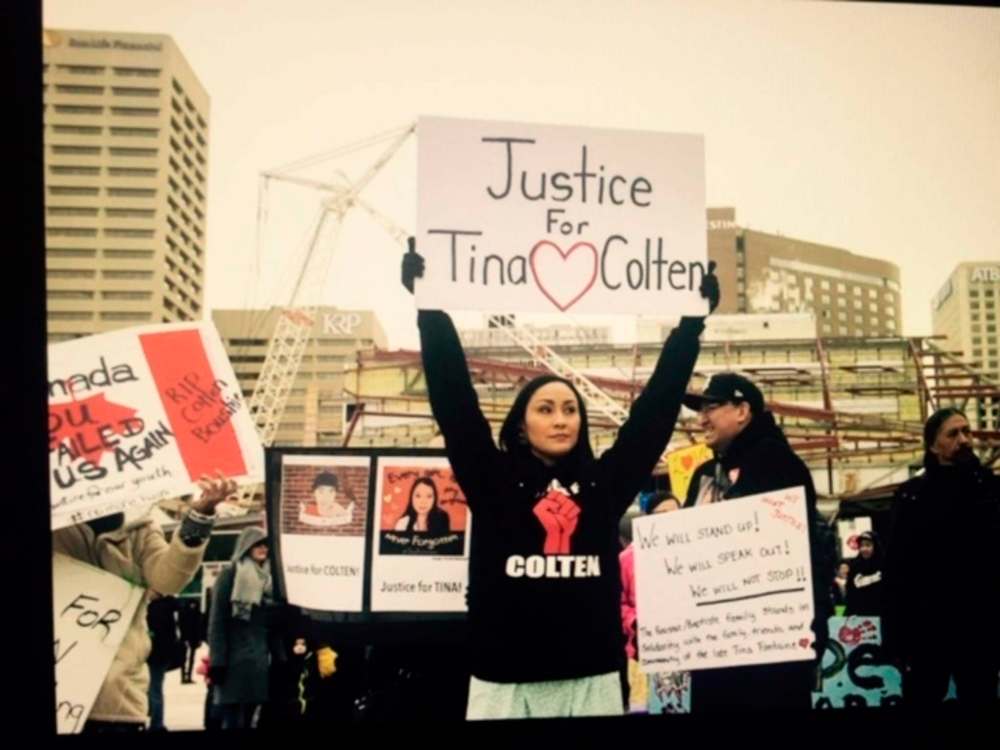Pain past, pain present
Cree filmmaker delivers stunning condemnation of Canada's ongoing mistreatment of Indigenous peoples in award-winning documentary
Advertisement
Read this article for free:
or
Already have an account? Log in here »
To continue reading, please subscribe:
Monthly Digital Subscription
$1 per week for 24 weeks*
- Enjoy unlimited reading on winnipegfreepress.com
- Read the E-Edition, our digital replica newspaper
- Access News Break, our award-winning app
- Play interactive puzzles
*Billed as $4.00 plus GST every four weeks. After 24 weeks, price increases to the regular rate of $19.00 plus GST every four weeks. Offer available to new and qualified returning subscribers only. Cancel any time.
Monthly Digital Subscription
$4.75/week*
- Enjoy unlimited reading on winnipegfreepress.com
- Read the E-Edition, our digital replica newspaper
- Access News Break, our award-winning app
- Play interactive puzzles
*Billed as $19 plus GST every four weeks. Cancel any time.
To continue reading, please subscribe:
Add Free Press access to your Brandon Sun subscription for only an additional
$1 for the first 4 weeks*
*Your next subscription payment will increase by $1.00 and you will be charged $16.99 plus GST for four weeks. After four weeks, your payment will increase to $23.99 plus GST every four weeks.
Read unlimited articles for free today:
or
Already have an account? Log in here »
Hey there, time traveller!
This article was published 04/07/2019 (2301 days ago), so information in it may no longer be current.
It’s rare that I see my lived experience reflected in film. As an Indigenous woman and a millennial, the most well-known instance of cinematic representation I had while growing up was the historically questionable Disney’s Pocahontas. For all the things that film was, “well-researched” or “mandatory viewing” are not words I would associate with it.
That’s definitely not the case with nîpawistamâsowin: We Will Stand Up, the latest documentary by Cree filmmaker and educator Tasha Hubbard (Birth of a Family), which is both exceptionally well-researched and should be mandatory viewing for every person living on Turtle Island, the land currently known as North America.
In nîpawistamâsowin, Hubbard, who is adopted, reflects on her experience growing up outside of her culture, the history of colonialism on the Prairies and raising her own children within a colonized nation.
The film debuted at Toronto’s Hot Docs festival in April and won the award for Best Canadian Feature Documentary, bestowing well-deserved recognition on an intensely personal and sharply political film that sensitively addresses the violent history of colonialism that is an inescapable part of Canada’s legacy as a country.
nîpawistamâsowin begins with Hubbard sharing teachings with her two children about the history of colonialism in Canada. Together, they read through archives documenting several of the major events that have taken place upon the land they live on (Treaty 6 territory, currently known as Saskatchewan).
The events include the signing of the numbered treaties, the relocation of First Nations communities to make way for continued European settlement, the ongoing enforcement of the Indian Act and the synonymous relationship between the concepts of “justice” and “respect” in Cree culture.
With humility and wisdom, Hubbard gently offers viewers a crash course in an enormously relevant and tragically misunderstood time of Canadian history. But nîpawistamâsowin does more than simply revisit the past; it brings us into the present day and offers a glimmer of hope for the future.
And a tragedy that attracted attention on an international level is the catalyst for bringing viewers back to the present. On Aug. 9, 2017, a 22-year-old Cree man from Red Pheasant First Nation named Colten Boushie was shot in the back of the head by Saskatchewan farmer Gerald Stanley.

The trial was well-documented and highly publicized. When Stanley, a settler, was acquitted of second-degree murder by a jury that had no Indigenous representation, a spotlight illuminated the numerous inherent biases and prejudices in Canada’s legal system.
In the years following the Truth and Reconciliation Commission and the Final Report of the Missing and Murdered Indigenous Women and Girls, Indigenous people have lived through what feels like an endless cycle of renewed idealism squashed by harsh reality. It’s difficult to see the way forward.
In a quest for a truth of her own to share with her children, Hubbard witnesses and captures the journey of Boushie’s family and their pursuit of justice, all the way from the local level through to the United Nations. These overarching threads of familial bonds beautifully highlight the value and importance of kinship within Indigenous communities.
nîpawistamâsowin is a visually interesting documentary and tells its interweaving stories of past, present and future in a variety of forms, including interviews, animation and paintings. The contrast of natural and urban environments is especially notable. The use of light and colour illuminates the landscape and weather patterns of the often overlooked Prairies, capturing the beauty of its vastness.
Near the start of the film one of Hubbard’s children asks, “Do you ever want to go back, like, how it was? Before the settlers came?” The other child replies, “I’m not sure.” I think a lot of Indigenous people would be likewise uncertain. I know I am.

The film may not change the minds of supporters of Gerald Stanley or others like him, but that also doesn’t seem to be its intention. Instead, it simply asks us to bear witness to, and hold space for, the continued impact of colonial violence endured by Indigenous peoples.
nîpawistamâsowin: We Will Stand Up is an offering of hope, a journey of healing and mandatory viewing for the people colonization has affected the most who are searching for a healthy way forward.
frances.koncan@freepress.mb.ca
Twitter: @franceskoncan


